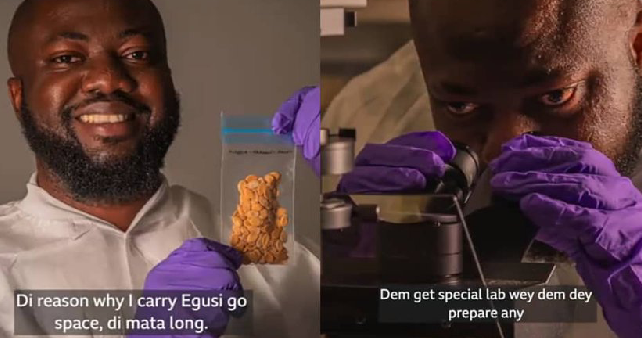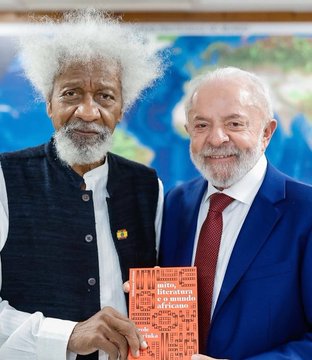
From Egusi to the Stars: Nigerian Scientist Temidayo Oniosun Dreams of Feeding Space Settlers with African Cuisine

When the conversation about the future of space travel comes up, most people imagine rockets, astronauts in space suits, and shiny domes on the Moon or Mars. Rarely does anyone think about what humanity will eat when they finally settle beyond Earth. But for Nigerian space scientist Dr. Temidayo Oniosun, food is at the heart of survival, culture, and identity, and he believes that Africa should not be left out of this discussion. With a bold vision that connects tradition with innovation, he has raised eyebrows across the global science community by talking about one of Nigeria’s most beloved delicacies—Egusi soup—as a potential food for space explorers. In his own words, “In the future, people will live on the Moon, on Mars, and other planets. They will need to eat.” And when that time comes, why shouldn’t they enjoy the rich flavors of home?
Dr. Oniosun, who is the founder of Space in Africa, has dedicated his career to putting Africa on the map in the global space industry. At a time when space exploration is often dominated by the likes of NASA, SpaceX, China’s CNSA, and Europe’s ESA, he has been working tirelessly to show that Africa too has a stake in the space economy. But instead of focusing only on rockets and satellites, Oniosun has brought something refreshing to the table—literally. His vision is not just about Africans sending satellites into orbit; it is also about ensuring that when humanity becomes a multi-planetary species, African culture and cuisine are not left behind.
Egusi, made from melon seeds, is one of Nigeria’s most iconic foods, loved across the country and enjoyed by millions in West Africa and beyond. It is hearty, nutritious, and deeply symbolic of communal life. Families gather around steaming bowls of egusi soup paired with pounded yam, eba, or fufu, and the dish has become more than just a meal—it is an expression of heritage. By imagining egusi in space, Oniosun is making a powerful statement: that African traditions are not only valuable on Earth but also have a place in shaping the future of humanity in outer space. This idea is not just about food but also about representation, culture, and innovation.
Feeding people in space is one of the greatest challenges of space exploration. At present, astronauts rely on packaged, dehydrated, and vacuum-sealed meals that often lack variety and cultural significance. For long-term missions, such as the colonization of Mars, experts know this will not be enough. Humans need food that is nutritious, sustainable, and psychologically comforting. What Oniosun is proposing taps into all these needs. Egusi seeds are rich in protein, fat, and essential nutrients, making them an excellent candidate for space diets. More importantly, they can be stored for long periods and prepared in different ways, which solves one of the biggest problems with feeding people in hostile environments like space.
Imagine a Nigerian astronaut stepping into a space habitat on the Moon after a long day of conducting research and being able to eat egusi soup, prepared in a futuristic kitchen with ingredients grown in controlled environments. The thought itself is inspiring. It symbolizes continuity between Earth and the stars, a reminder that no matter how far humans travel, culture travels with them. Oniosun’s vision speaks not just to Africans but to humanity as a whole: the idea that our cultural identities should not be erased by progress but carried along into the future.
Of course, the idea of taking egusi to space is also deeply symbolic of Africa’s rising voice in science and technology. For decades, Africa was seen as a continent that consumed space knowledge rather than created it. Today, the narrative is changing, and thinkers like Oniosun are leading the charge. Space in Africa, the organization he founded, is a research and consulting firm that tracks the African space and satellite industry. Under his leadership, the company has provided data and insights that help governments and private players understand the opportunities in space. By adding the conversation of food and culture into the mix, Oniosun is showing that the African space dream is not limited to machinery but encompasses the fullness of life.
The significance of this cannot be overstated. Food has always been a part of human migration and settlement. When explorers traveled by sea centuries ago, they carried spices, grains, and seeds that shaped the cuisines of entire continents. Today, as humans prepare to embark on the greatest migration of all time—beyond Earth—the same questions of food security and cultural preservation arise. Oniosun’s contribution is to remind the world that African food, particularly egusi, deserves a seat at that futuristic table. This is not just about taste; it is about survival, identity, and inclusion.
His vision has sparked excitement and debate, with many Nigerians joking about astronauts eating egusi soup with pounded yam on Mars. Yet beneath the humor lies a serious conversation about how Africa must prepare for the future. Space is not just about science fiction anymore; it is becoming an economic frontier that will determine which nations thrive in the 21st century. By linking egusi to space, Oniosun has created a metaphor for Africa’s participation. Just as egusi can be cultivated, preserved, and transformed for new environments, so too can African knowledge, talent, and culture be adapted to shape the world of tomorrow.
The dream of living on the Moon or Mars is not as far-fetched as it once seemed. Space agencies are already testing sustainable habitats, artificial farming systems, and advanced technologies to make interplanetary living possible. Companies like SpaceX are pushing aggressively toward Mars colonization, and governments are investing billions into space research. Oniosun’s voice in this global chorus ensures that Africa is not silent, that the continent contributes not only scientifically but also culturally to this journey. Egusi in space may sound unusual, but it is an idea that captures imagination—and imagination is the fuel of progress.
For Nigerians and Africans everywhere, the story is more than scientific speculation; it is a source of pride. It suggests that their traditions will not be left behind in a rapidly changing world. In the same way that pizza and hamburgers represent American culture, or sushi represents Japanese innovation, egusi may one day represent Africa on the menu of the cosmos. Children growing up in Nigeria can now imagine themselves not only becoming astronauts but also eating the food of their ancestors while gazing at Earth from another planet. It is a powerful vision of continuity, belonging, and ambition.
Dr. Temidayo Oniosun has shown that the future is not only about machines, rockets, and numbers, but also about the very human things that keep us connected—food, memory, and culture. By daring to dream of egusi in space, he is not only expanding the conversation about space exploration but also planting a seed of inspiration for generations to come. And perhaps, when the first African astronaut finally eats egusi soup in a lunar colony or on a Martian outpost, the world will remember that the journey to the stars was never just about escaping Earth—it was about carrying Earth with us.


